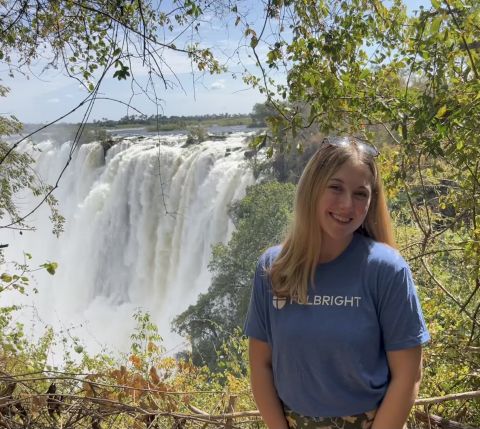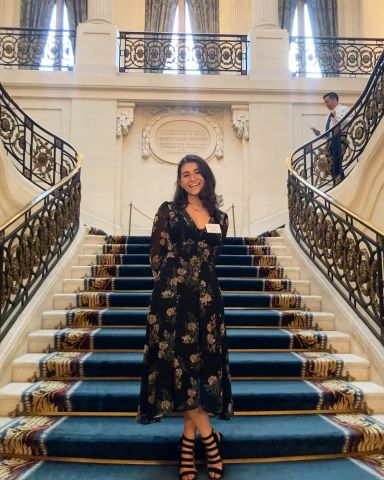Cornell Celebrates Bumper Crop of Fulbright Students

Successful Applicants Double
In 2022–23, 15 U.S. Student Program winners from Cornell will head out to host countries worldwide.
By Jackie Swift
Clara Rice ’21 knew she wanted to spend as much time as she could as a Cornell student living and learning abroad. When her plans for an internship in Kenya in the summer of 2020 were canceled because of COVID-19 travel restrictions, she looked for a new opportunity.
Then she learned about the Fulbright U.S. Student Program, administered at Cornell by the Mario Einaudi Center for International Studies. She was drawn to the research fellowship, which allows recipients to define and carry out their own projects in a host country.
“I was really excited by the way the Fulbright gave me the chance to choose anywhere in the world to travel and the opportunity to guide my own research,” she said.
Rice is one of seven 2021 graduates and recent Cornell alumni who accepted Fulbright U.S. Student awards to research, study or teach English during the 2021–22 academic year. COVID-19 travel restrictions stymied the previous year’s Fulbright students. With that in mind, Rice and the small cohort applying at the height of the pandemic were eager to jump in as soon as the program cleared them to travel.
Despite pandemic delays, the current Fulbrighters were all able to arrive in their host countries by April.
“The pandemic brought disappointment and anxiety to all of us, but Fulbright applicants are more optimistic now,” said Stefan Senders, one of two Fulbright advisors at Einaudi. “They tend to have an eye to possibility, and they look for a path forward—whether in their own lives or in our shared existence. They want to make what impact they can.”
This sense of optimism brought out a large pool of applicants this year across the country—and a bumper crop of 15 U.S. Student Program award winners at Cornell for 2022–23:
- Micah Benoit ’21 (College of Agriculture and Life Sciences): Research in Brazil
- Alethia Chan ’22 (CALS/Dyson): English teaching in Indonesia
- Rachel Christopherson ’22 (College of Arts and Sciences): Research in Germany
- Jay Doshi ’22 (CALS): Research in Canada
- Samantha Fountain ’22 (College of Human Ecology): Study in the United Kingdom
- Aadi Kulkarni ’22 (Brooks School/CHE): Research in Denmark
- Vanessa Olguín ’22 (A&S): Research in Peru
- Supriya Pandit ’22 (CHE): Research in India
- Megan Rochlin ’21 (A&S): English teaching in Brazil
- Brendan Rosen, MPS ’21 (CALS): Research in the Philippines
- Odeya Rosenband ’22 (A&S): English teaching in the Czech Republic
- Elena Runfeldt ’22 (CHE): Research in Barbados
- David Sheng ’22 (A&S): Research in Japan
- Catherine St. Hilaire ’22 (School of Industrial and Labor Relations): Research in Canada
- David Wang ’20 (A&S): Study in the Netherlands
Cornell has a history of successful Fulbright applications. One in four Cornell applicants for the U.S. Student Program wins an award, while nationally the average is one in six. Since the 1940s, more than 500 Cornellians have traveled abroad through the program.
Rice, who majored in health care policy, chose Zambia as her host country partly because she had lived in the capital city, Lusaka, while contributing to a nutrition research project through the Cornell Global Health Summer Program. She fell in love with the relaxed lifestyle, the friendliness of Zambians, and the natural scenery, she explained.
“Zambia was the natural choice for the Fulbright,” she said. “I felt comfortable knowing that my first experience living abroad for a year would be in a place where I already had a few connections and knew my way around some important logistics.”
She was able to travel in October to Zambia, where she is conducting a research project on disruptions in the country’s contraceptive supply chain. “I’ve learned a lot about how health supply chains are structured,” she said. “And I’ve solidified my interests in working in this field in the future.”
On the other side of the world, Amanda Cronin ’21 arrived in March for her Fulbright English teaching assistantship in La Plata, Argentina. Cronin majored in environmental science at Cornell. Along with teaching university students, she plans to focus on environmental justice issues for the community engagement project that is part of her Fulbright requirement.
After two months in Argentina, she is already leading workshops and has dined with the ambassador and tried out local customs, like drinking mate with friends. She is also learning about the country’s environmental issues, she said, including how Argentina’s government and NGOs are allocating resources for the people most vulnerable to climate change.
“Argentina is really diverse, both ecologically and culturally,” she said. “With this diversity comes a variety of climate change challenges—wildfires, drought, deforestation, ecosystem collapse—similar to threats the U.S. faces. Argentina is also a nation of immigrants, like the U.S. We can learn a lot from each other's strategic responses to these shared issues.”
When Cronin first heard about the Fulbright English teaching assistantship, she was unsure if she would qualify for it. She was a Cornell Daily Sun editor and had experience as a writing center tutor and teaching assistant, but she didn’t know if her background would match the program’s criteria.
“I couldn’t have gone through the Fulbright application process without the support of the people at the Einaudi Center,” she said. “I attended Einaudi’s information sessions and learned that I didn’t need direct experience teaching English to non-native speakers. Instead, I needed to demonstrate literacy mastery and experience in instruction.”
With the help of Senders, Cronin learned how to structure and develop the essay that is the heart of the Fulbright application. “He guided me to write about how I am uniquely suited to build collaboration between the two countries,” she said. “I tell my students all the time, I’m here to learn just as much as you are.”
Senders agrees that applying for a Fulbright is challenging. “It’s not easy to win,” he said. “Not all Cornell applicants get one. But students tell us that the application process—the writing, discussion, argument and strategizing—is often as life-changing as winning the award itself.”
Rising seniors, May graduates, and recent alumni interested in applying for 2023–24 awards should email fulbright@einaudi.cornell.edu as soon as possible in order to meet this year’s August 29 national deadline.
For Rice, the application process brought clarity to her academic interests, while winning the award and traveling to Zambia opened up the world to her.
“Given the flexibility of my self-directed project, I’ve been able to travel all over Zambia,” she said. “Recently, I attended two traditional ceremonies—N’cwala and Kuomboka—where I learned about the histories of two of the largest tribes in Zambia. The chance to attend these ceremonies and to make new friends from all over the world far outweighs anything I could have read in a book or learned in a classroom.”
Jackie Swift is a freelance writer for Global Cornell.


